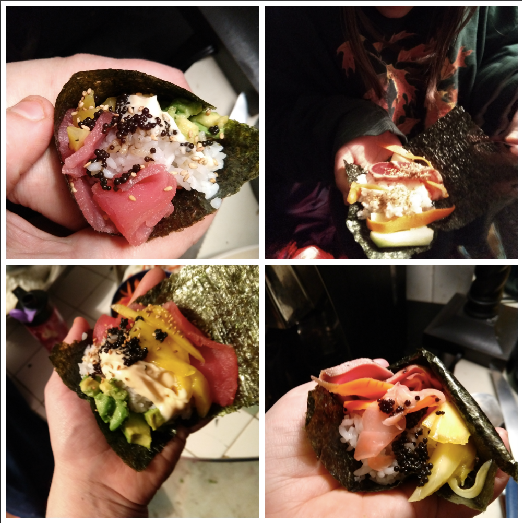First a prayer request: My father is in the hospital, waiting for heart surgery. He’ll have a triple bypass, or possibly a quadruple bypass, on Tuesday. We’re very glad this surgery is available, and have high hopes he’ll start feeling better than he has in a long time once he’s recovered; but of course the recovery is long and hard, especially since he is 75 and has other medical issues. He lives alone, close to where my mother’s nursing home, but an hour or more away from all his children, so the logistics are a little daunting.
Thank you!
And now the food! We ate so much ridiculously good food this past week:
SATURDAY
Gosh, this seems like so long ago. Saturday we went ice skating and came home to have hot chocolate, popcorn, and grilled ham and cheese. Corrie was very very enthusiastic about skating and won all the races.

I did a lot of skating with Benny, until the moment came when I leaned too hard on the skating frame and it collapsed. Le sigh.
***
SUNDAY
New Year’s Eve. We pretty much ate all the food that is available to the known universe.
Some friends sent a huge, spectacular hamper packed with luxurious treats, so we hauled out all the various tea sets you accumulate when you have eight daughters, and had a sort of rolling English tea party. Tragically, I forgot to take pictures of my own, but you must take my word for it that it was fancy beyond all reason:

If you don’t have extraordinarily generous friends who send you luxury hampers, I recommend getting some right away.
While everyone continued feasting and being fancy, my husband casually strolled into the kitchen to prepare, you know, a little sauteed scallops topped with shredded duck and Hollandaise sauce.This photo miserably fails to capture how rich and sumptuous this dish is.

If you don’t have a husband who likes to casually stroll into the kitchen and make your dreams come true, I recommend getting one right away.
This dish is not an obvious combination of flavors, but it makes so much sense once you’re shoveling it into your mouth.I thought duck would be more or less like dark turkey meat, but it’s really almost closer to lamb. So good. A wonderful meal for a special treat. (Aldi has both duck and scallops on sale every so often!)
And now the sushi! Yes, we had a sushi party on the same day as our English tea and our duckstravaganza. It made sense at the time.
First, I bought good rice and several packages of nori, soy sauce, rice vinegar, wasabi, pickled ginger, a little jar of roe, tuna steaks that were frozen at sea, some seared and seasoned tuna, canned salmon for the sissies, fake crab legs, toasted sesame seeds, avocados, mangos, carrots, cucumbers, and chop sticks, which we forgot to use.
I bought a sack of Nishiki rice, which is just gorgeous, like mother of pearl. It is expensive, but definitely worth it for a treat. I used the sushi rice recipe in this post (after skimming, with growing horror, through numerous other recipes that discussed whether it was more auspicious to rinse the rice 54 or 128 times before cooking), except I didn’t use quite that much salt. I cooked six cups of raw rice in the Instant Pot, which makes good sticky rice.
While the rice was cooking, I peeled the carrots into strips and pickled them, and we stirred some hot sauce into some mayo, and sliced the tuna as thin as I could, and the kids helped prep the avocados, mangoes, and cucumbers. It was all so lovely.

Now that I have ramekins, I use them all the time. Ramekins!
When the rice was done, I carefully sprinkled the vinegar mixture over it (I sextupled the recipe, but didn’t need that much) and then Benny’s moment of glory came: She used her special gold lace fan to vigorously fan the rice while I carefully turned it:

I guess you fan it to evaporate the vinegar, so the rice takes on the flavor without getting mushy. It worked!
We couldn’t find the rolling mat, so we opted for sushi cones, where you break a panel of nori in half, set the rice and fillings on one side, and roll it up diagonally. It took a while to get the hang of it, and they were not dainty, but on the other hand, NOM NOM NOM NOM NOM.
We kept the rice covered while everyone took turns building their sushi cones. A few variations:

It was fantastic. Just about everyone found some combination to their liking. Some of the kids skipped the nori altogether, and made deconstructed sushi; some of them just used rice and vegetables; some of them (okay, me) just parked themselves in front of the tray and systematically worked through eleven different combinations.
We’re doing this every New Year’s Eve from now on. What ingredients would you add?
***
MONDAY
Birthday! Baby New Year turned twelve and requested calzones.

To make twelve calzones, I used three balls pizza dough divided into fourths, then made the cheese filling (this was more than enough):
32 oz ricotta
3-4 cups shredded mozzarella
3/4 cup parmesan
1 Tbs garlic powder
2 tsp oregano
I stretched the dough portions into the size of small plates, then added a ball of cheese mixture, plus whatever fillings were requested. I folded the dough over and pinched the ends tightly shut, then pressed the calzone to spread out the filling evenly.
We greased two baking trays with shortening and sprinkled them with corn meal, laid the calzones on (with a few inches in between, as they puff up), and brushed the with egg yolk beaten with a little water.

I baked them at 450 for — okay, I don’t remember how long. Maybe 15 minutes?

Then we served them with ramekins (ramekins!) of hot marinara sauce for dipping.
We made this one-bowl chocolate cake recipe. I didn’t taste it, as chocolate is a huge migraine trigger, but it looked pretty good. Decorations courtesy of the 90% off shelf after Halloween. I’m a saver.

We made chocolate frosting with a recipe on the side of the cocoa powder can. I think it was just shortening (we had run out of butter!), chocolate, and powdered sugar.
My son took a few pictures of his sister blowing out her candles, and then Google helpfully and spontaneously merged them into this horrifying glimpse into the spirit realm of birthdays:

I don’t want to know what that creature wished for.
***
TUESDAY
Chicken enchiladas and beans and rice
One of the college girls offered to make chicken enchiladas before she flies away again. They were so good. She used boneless chicken thighs with Pioneer Woman’s recipe, and made thirty nice enchilada longbois, some red and some green.

I made some quickie beans and rice. Cooked up a few cups of rice and added a can of black beans and a can of chili kidney beans, drained, a can of Ro-Tel tomatoes, some jarred jalapenos, and a bunch of cumin, chili powder, and salt.
***
WEDNESDAY
Pork ramen
We just had this, but I like it. I browned up some boneless pork ribs in olive oil, then sliced them thin, and then I cooked up some frozen stir fry veggies in the pork pan. I made a dozen or so soft-boiled eggs in the Instant Pot. The trick is to do a quick release after cooking, then dunk them in ice water, and then shells slide right off, almost in one piece. Not necessarily easier than using the stove, but a good trick if the stove is in use or if you really want unblemished whites.

I served a big pot of cheap ramen and let people choose pork, veggies, and eggs, plus sesame seeds, hot sauce, soy sauce, and chopped scallions.
Do you make fancy ramen? What do you add? I like this meal, but would like some more variety in the add-ins.
***
THURSDAY
French toast?
I am not sure. We had a pretty good storm going, and school was cancelled, but we got the news in the morning that my dad was going to need heart surgery, and was going to meet with the surgeons on this day.
So Damien and I rolled slowly north through the storm to the hospital while the kids managed at home. We had a good visit (the only thing my father requested was The Odyssey, Fagles translation) and I like the surgeon.
We thought we’d have to spend the night, but the snow slowed down toward evening, so we pushed ahead to get home, stopping only for Five Guys, because where else would you go on your way home from a visit to the cardiology wing?

I know this isn’t the popular opinion, but while their fries were quite good, I thought the burgers were just okay. The meat was kind of mealy, and the buns were just too greasy to be enjoyable. Huge portions, though. You can see that I am not complaining.
Then we trundled the rest of the way home through the last of the storm, and Damien installed me on the couch with a lot of red wine and The Big Lebowski.
***
FRIDAY
I think we are having beef stew.
We’ll say an extra decade of the rosary because it’s Friday, but I have this big hunk of beef going unheeded in the fridge, and it has been quite a week.
QUITE A WEEK. Here is a picture of my dad from this summer, talking (possibly about the Declaration of Independence) with my brother Joe:

My father’s name is Phil, if you’d care to mention him in your prayers! Thank you.























